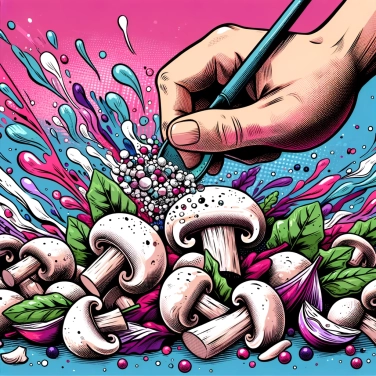Cooking mushrooms without fat before adding oil helps to eliminate excess water contained in the mushrooms, promoting a more flavorful texture by preventing them from cooking in their own juice and allowing better absorption of oil for a more pronounced taste.

When you cook mushrooms without oil, the heat first causes the evaporation of the water they contain. This concentrates their flavors and avoids the slightly slimy or rubbery effect you sometimes get when cooking them directly in oil. Most importantly, it encourages the Maillard reaction, a chemical reaction that occurs between sugars and proteins under dry heat. This is what creates that delicious golden crust, with toasted and slightly caramelized flavors. Without fat at the start, the mushrooms sear better, revealing deeper aromas and a much more pleasant texture to the bite.
Cooking the mushrooms first without fat allows their vegetation water to evaporate quickly. As a result, instead of having a soft and spongy texture, you achieve a firmer, slightly crisp and golden consistency. Moreover, this "dry" cooking method further concentrates their natural flavors: you experience the true taste of the mushroom, which is more intense, more savory, and significantly less bland. Then, once the water has been released, you add oil or butter to finish cooking and bring crispiness without the mushrooms becoming oily and greasy.
Adding the oil during cooking rather than at the beginning allows the mushrooms to first release their water and thereby get rid of their natural moisture. As a result, they sear better once the oil is added, becoming more crispy and golden instead of soft or soggy. By adding the oil later, we have better control over the cooking process while achieving a more intense flavor and better texture.
Use a well-heated pan so that the mushrooms quickly release their water without sticking to the bottom. Absolutely avoid salting them immediately: salt draws out water, which slows down cooking. Let them cook on their own, stirring very little. Wait until they have completely lost their water and start to turn a nice golden color before adding your fat. At that point, you can drizzle in some olive oil, or add a knob of butter for a richer flavor. Only then should you season your mushrooms with salt and other spices or herbs to your taste.
The mushroom is made up of almost 90% water: cooking it without fat allows this water to evaporate effectively, ensuring a firmer and more flavorful texture.
Adding salt immediately while cooking mushrooms speeds up moisture evaporation, thereby enhancing their browning and final flavor.
Mushrooms are naturally rich in umami, this savory taste often referred to as the 'fifth taste.' Proper cooking allows this characteristic flavor to be fully revealed.
In traditional Japanese cuisine, mushrooms are often cooked without any fat to preserve their original flavor and crunchy texture before being incorporated into various dishes.
All mushrooms benefit from this technique, but this is especially true for those with a high water content, such as button mushrooms, chanterelles, or oyster mushrooms. This step allows for a firmer and more concentrated texture.
Yes, adding butter after cooking without fat will allow for a slight caramelization and will bring a rich and indulgent flavor to your mushrooms.
Generally, 5 to 7 minutes over medium-high heat is enough for the mushrooms to release their moisture and start to brown slightly. Once all the water has evaporated, it's the perfect time to add oil or butter.
No, this method does not significantly alter their nutritional qualities. It only helps to concentrate their flavors and improves their texture by reducing moisture.
Yes, this technique is highly recommended as it intensifies the mushroom flavor in dishes such as sauces, soups, or risottos, while avoiding excess moisture.
No, as long as you use a hot non-stick pan and stir regularly. The mushrooms will first release their natural moisture, preventing them from sticking to the cooking surface.

0% of respondents passed this quiz completely!
Question 1/5